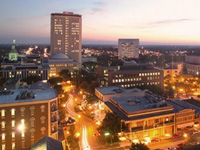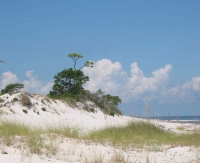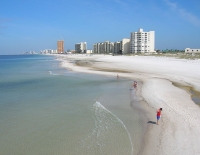City guides


Pensacola Travel Guide
Pensacola lies close to the Alabama state border on the Gulf coast, and is one of the more laid-back cities in Florida. With its many historic and natural charms, it will give travellers ample opportunity to sit back and relax in this beach paradise.
Ancient Native Americans left their mark around the natural deep-water harbour, before the Spanish Colonists arrived in 1559. It was the start of a long rivalry for control of the port, with France, Great Britain, the United States and the Confederacy battling it out for years. They left the city with blended architectural influences ranging from Spanish brickwork and French wrought-iron balconies to Victorian mansions. Pensacola's heritage is on display in the Seville Historic District as well, and the city also has a noteworthy Historical Museum.
Apart from ancient history, Pensacola is known for its current stars, the Blue Angels precision flying team of the US Navy, who are based here and hold thrilling exhibitions. The US Naval Air Station is situated to the west of the city next to the National Museum of Naval Aviation.
In and around Pensacola, beaches abound along the coastline and the Gulf Islands, particularly at Perdido Key and Pensacola Beach with their luxury resorts.
Things to do in Pensacola
Pensacola caters for a more sedate market who appreciate excellent seafood, miles of deserted beach, spectacular views, scuba diving on shipwrecks, and exploring the local historic sites. Fifty-odd miles (80km) of white sandy beach should be enough to draw sun-seekers to holiday in Pensacola, but this Florida city contains much more than natural attractions and historic sites.
The city is home to the US Navy's Blue Angels flight squad, and is renowned for the spectacular air displays that attract hundreds of spectators to Pensacola. The National Museum of Naval Aviation also holds a number of other interesting military craft and exhibitions.
Pensacola is celebrated for its location as well, as Tallahassee and Panama City are close by and Amelia Island, Santa Rosa Island, and the Gulf Islands National Seashore offer many diversions for visitors, making the city a great travel base for those wanting to explore the surrounding coastline and islands.
National Museum of Naval Aviation
Located on site at the sprawling US Naval Air Station west of Pensacola, the institution is one of the largest and most remarkable air and space museums in the world, with more than 170 aircraft on display, dating from the 1920s to the space age. In addition, the museum boasts a very realistic recreation of a World War II aircraft carrier and a wartime Pacific airbase. Between March and November visitors might catch a practise session of the Navy's Blue Angels flight demonstration team soaring through the skies. If not, the team can be seen in action in one of two IMAX films shown at the museum. Keen would-be aviators can have a go at doing it themselves on the flight simulator.

Tallahassee
The capital city of Florida, Tallahassee, is located 191 miles (308km) east of Pensacola on the 'Big Bend', close to the border with Georgia, which is 14 miles (23km) to the north. More reminiscent of the Deep South than sunny Florida, with its fragrant magnolia trees, and old plantation houses, Tallahassee is home to Florida State University and the state's new Capitol Building, which towers 22 storeys above the downtown area. The city's five Canopy Roads, where trees form tunnels, are lined with sites such as plantations, ancient Native American settlements and mounds, gorgeous gardens, and scenic picnic spots. There's also a Museum of Natural History and Science combined with a natural habitat zoo of indigenous wildlife.

Gulf Islands National Seashore
Located on the western end of the Florida panhandle, Gulf Islands National Seashore is a 150-mile (241km) stretch of undeveloped beach. What it lacks in tourist traps, it makes up for in sheer beauty. Camping, hiking, and biking in the isolated regions is a treat for travellers looking to get away from the crowded resorts of southern Florida. The park includes several islands, including Santa Rosa Island (home to the popular Fort Pickens Campground), Perdido Key, Horn Island, and West Ship Island (home of Fort Massachusetts). There are limited restaurants and shops in the Gulf Islands National Seashore region, though most camping sites are near enough to coastal beach communities that visitors don't need to bring everything with them, and won't have to travel too far to find necessary amenities.

Panama City
Panama City lies near Pensacola on the Gulf Coast of the Florida Panhandle, and is a popular travel destination. Set along 27 miles (43km) of white sand beaches, the town is a great place for families on holiday in Florida as there are plenty of outdoor activities available in St Andrews State Park and Pine Log State Forest, and there are interesting city attractions such as the Panama City Center for the Arts and Ripley's Believe It or Not! Museum. Panama City is usually a fairly quiet town, but it comes alive each spring as thousands of students flock to the town for Spring Break. Concerts, parades, and other events are regular occurrences during this period. Travellers looking for peace and quiet should remember to avoid Panama City at this time.
Getting Around
The Escambia County Area Transit System (ECAT) runs public buses around the city daily, although service is more limited on weekends. There are bicycles and scooters for hire, and taxis can be ordered by telephone from various companies. Most visitors to Pensacola opt to hire a car, which provides maximum convenience for exploring the city and surrounding region. Uber and other similar mobile app-based taxi services are also available.
Pensacola Climate and Weather
Pensacola has a humid subtropical climate, with short, mild winters and hot, humid summers. Summer temperatures are moderated by the southerly prevailing winds from the Gulf of Mexico and temperatures in the peak summer months, between June and August, average between 72°F (22°C) and 89°F (32°C), though highs can reach 100°F (38°C). Summer is the wettest season, with frequent afternoon thunderstorms providing relief from the heat. In winter, between December and February, temperatures average between 42°F (6°C) and 63°F (17°C). Snow is rare in Pensacola. The city enjoys an average of 228 days of sunshine a year, making it a year-round travel destination, but visitors should note that late summer and autumn can be very windy.
United States of America travel info
Electricity
The electrical current is 120 volts, 60Hz. Plugs are mainly the type with two flat pins, though three-pin plugs (two flat parallel pins and a rounded pin) are also widely used. European appliances without dual-voltage capabilities will require an adapter.
Language
English is the most common language spoken but Spanish is often heard in the south-western states.
Money
The official currency is the US Dollar (USD), which is divided into 100 cents. Only major banks exchange foreign currency. ATMs are widespread and credit cards are widely accepted; Apple Pay and Google Pay are very popular. Banking hours are Monday to Friday 9am to 3pm.
Tipping
A 15 percent tip is expected by taxi drivers, bartenders, hairdressers and waiters, but travellers shouldn't tip in fast-food or self-service restaurants. In expensive restaurants or for large parties, the tip should be 20 percent of the bill. It's normal to tip staff such as valets and porters in hotels; this is discretionary, although a minimum of $5 is expected. Most services are customarily tipped if the service is good.
Health
There are no specific health risks associated with travel within the USA. Medical facilities are excellent, but expensive. Only emergencies are treated without prior payment and treatment can be refused without evidence of insurance or proof of funds. Good medical insurance is essential.
Safety
Travel within the United States is generally trouble-free, though travellers should be aware that the US shares with the rest of the world an increased threat from terrorist incidents. Security has been heightened, particularly at airports. Restrictions on hand luggage apply and travellers are advised to check on the latest situation with airlines in advance. Travellers should also be alert to the dangers of car and street crime in cities and should use common sense and take basic precautions. Hurricanes are common between June and November, putting the southern USA, including the Gulf Coast and the eastern US at risk. There's a risk of wildfires in many dry areas in the US, particularly on the West Coast from March to November.
Local customs
Laws vary from state to state, including speed limit, fines and punishment. The age at which alcohol may be legally bought and consumed is 21 years.
Doing business
In such a large country, filled with so many diverse groups, business practices may differ according to each state, though rarely to any large degree. The East Coast is traditionally more formal than the West Coast, though in states such as California, dress code and conservative appearance are as common as they would be in New York. Punctuality is important throughout the country and it's considered rude to be late for a meeting. Gift-giving is uncommon as it may be construed as bribery. Appropriate titles (Mr, Mrs, Ms) are used upon introduction and until otherwise stated. Americans favour politeness and greetings of 'Hello' and 'How are you?' are often expressed with sincerity. Business hours may vary in each state, but an 8am start and 5pm finish Monday to Friday is the most common with an hour over lunch.
Status and age are not necessarily indicative of seniority, nor do they carry much weight in themselves. Those doing business in the States should be mindful of this fact; foreigners should never make assumptions about someone's position or rank. Best practice is to be respectful to all parties. That said, the US upholds a hierarchal business structure in which 'the boss' is the ultimate decision-maker. Senior leaders have the power of the last word, and can go against the grain just as easily as they can follow popular opinion. Foreigners should concentrate on winning over this individual, even if the greater group seems unsupportive. Americans value a direct style of communication. In this fast-paced, consumer culture 'time is money', and small-talk is viewed as unnecessary and wasteful. It's best for foreigners to get to the point quickly, speak about issues in a frank and open manner, and to avoid taking offence if someone questions or challenges them outright.
Duty free
Travellers to the United States who are returning residents of the country do not have to pay duty on articles purchased abroad to the value of $800 provided their stay was longer than 48 hours and their duty-free allowance was not used in the 30-day period prior. For passengers arriving from Samoa, Guam and the U.S. Virgin Islands, a duty-free allowance of $1,600 is allowed. The following items are included in this: 50 cigarettes and 10 cigars and 150 millilitres (5 fl. oz.) of alcoholic beverages or 150 millilitres (5 fl. oz.) of perfume containing alcohol. Restrictions may apply to goods from Cuba, Iran, North Korea, Burma (Myanmar), Angola, Liberia and Sudan. It is prohibited to import Cuban cigars from any country.
Travellers to the United States who are non-residents do not have to pay duty on the following items: 50 cigars or 200 cigarettes and gifts to the value of $100 provided their stay in the USA is not less than 72 hours and that the allowance has not been used in the preceding six-month period.
Prohibited items for residents and non-residents include meat or meat products, poultry, narcotics, absinthe, plants, seeds, vegetables, fruits, soil, live insects and other living plants or animal pests. Fish is prohibited unless it carries disease-free certification. Wildlife and animals or their by-products carry restrictions. Dairy products and eggs from specified countries are not allowed. Firearms and ammunition are not allowed without the necessary license and permit.
Communications
The international country dialling code for the United States is +1. Mobile networks cover most of the country, especially all urban areas; travellers can purchase local prepaid SIM cards for unlocked phones or use eSIMs if their cellular providers support it on their networks. WiFi is widely available.
Passport & Visa
It is highly recommended that travellers' passports have at least six months' validity remaining after the intended date of departure from them travel destination. A visa is required for short visits unless travellers qualify for entry under the Visa Waiver Program.
The Visa Waiver Program (VWP) enables citizens of certain countries to travel to the US for a stay of up to 90 days without a visa. Visitors under the VWP need a valid Electronic System for Travel Authorization (ESTA), which allows the US government to screen all visitors before travel. Visitors entering the country under the VWP must have a machine-readable passport (MRP) that has a barcode on the photo page. Travellers under the VWP must have passports that include biometrics if they wish to enter the country without a visa, which means that passports must contain unique personal data such as fingerprints or iris details. All passports must contain a digital photo image in order to travel visa-free. All visitors to the USA have a photograph and two fingerprints taken by an inkless scanner on arrival, including those travelling visa-free under the VWP.
As part of the Western Hemisphere Travel Initiative (WHTI), all travellers travelling between the United States and Canada, Mexico, Bermuda, and the Caribbean region are required to present a passport or other valid travel document to enter or re-enter the United States. If departing from the USA, a valid passport is required by immigration authorities. Immigration officials often apply different rules to those stated by travel agents and official sources.
Entry requirements
US citizens require passports.
UK nationals require a passport valid for duration of stay. Most passport holders can get an Electronic System for Travel Authorisation (ESTA) through the Visa Waiver Programme, which allows travel to the US for up to 90 days. The VWP includes tourism, certain types of business visit and transit to another country.
The most important requirement on entering the U.S. is providing proof of Canadian citizenship. A valid Canadian passport is the best document to prove Canadian citizenship and the right to return to Canada. However, several other documents can serve, depending on the mode of transport. Generally, Canadian citizens do not require visitor, business, transit or other visas to enter the United States from Canada, though there are some exceptions.
Passports must be valid for the period of intended stay. If visiting the US for fewer than 90 days, Australian nationals may be eligible to apply for an Electronic System for Travel Authorization (ESTA), and enter under the Visa Waiver Program (VWP).
South Africans must hold a passport valid for duration of stay. A visa is required.
Passports must be valid for duration of stay. Irish nationals can get an Electronic System for Travel Authorisation (ESTA) under the Visa Waiver Programme for entry into the United States.
Passports must be valid for duration of stay. New Zealand nationals can get an Electronic System for Travel Authorisation (ESTA) under the Visa Waiver Programme for entry into the United States.
Useful contacts
United States Tourist Office: www.usatourist.com
911 (General)Embassies / consulates in other countries
United States Embassy, London, United Kingdom: +44 20 7499 9000.
United States Embassy, Ottawa, Canada: +1 613 688 5335.
United States Embassy, Canberra, Australia: +61 2 6214 5600.
United States Embassy, Pretoria, South Africa: +27 12 431 4000.
United States Embassy, Dublin, Ireland: +353 1 668 8777.
United States Embassy, Wellington, New Zealand: +64 4 462 6000.
Embassies / consulates in United States of America
British Embassy, Washington DC: +1 202 588 6500.
Canadian Embassy, Washington DC: +1 202 682 1740.
Australian Embassy, Washington DC: +1 202 797 3000.
South African Embassy, Washington DC: +1 202 232 4400.
Irish Embassy, Washington DC: +1 202 462 3939.
New Zealand Embassy, Washington DC: +1 202 328 4800.


